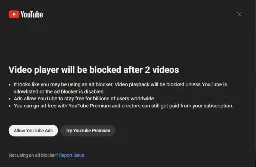Inside the 'arms race' between YouTube and ad blockers
Inside the 'arms race' between YouTube and ad blockers

www.engadget.com
Inside the 'arms race' between YouTube and ad blockers

From the article: “In some ways, the current situation has spurred an arms race. YouTube has inadvertently improved ad blockers, as the new knowledge and techniques gained from innovating within the YouTube platform are also applicable to other ad and tracking systems.”
